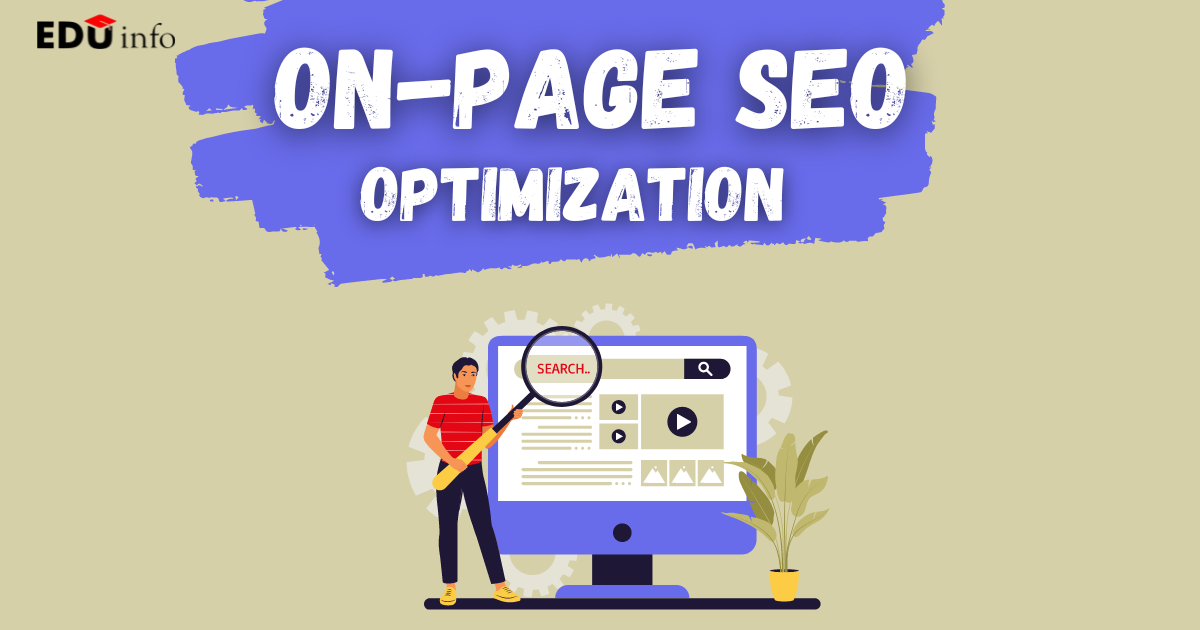Search engine optimization is constantly becoming an advanced field in 2025, and on page SEO is also more important than off-page SEO and technical SEO for achieving higher rankings and visibility in search engine results. In the digital marketing era, on-page SEO is a fundamental pillar to enhance your website’s visibility and organic traffic.
What is On-Page SEO and Why is it Important?
On-page SEO optimizes the individual website content to rank higher in search engines and earn relevant traffic. It involves optimizing a page’s content and HTML source code. Some main on page elements, such as headings, titles, meta descriptions, and internal links, website owners can make their website pages more visible to search engines and users.
Some essential on-page SEO elements:
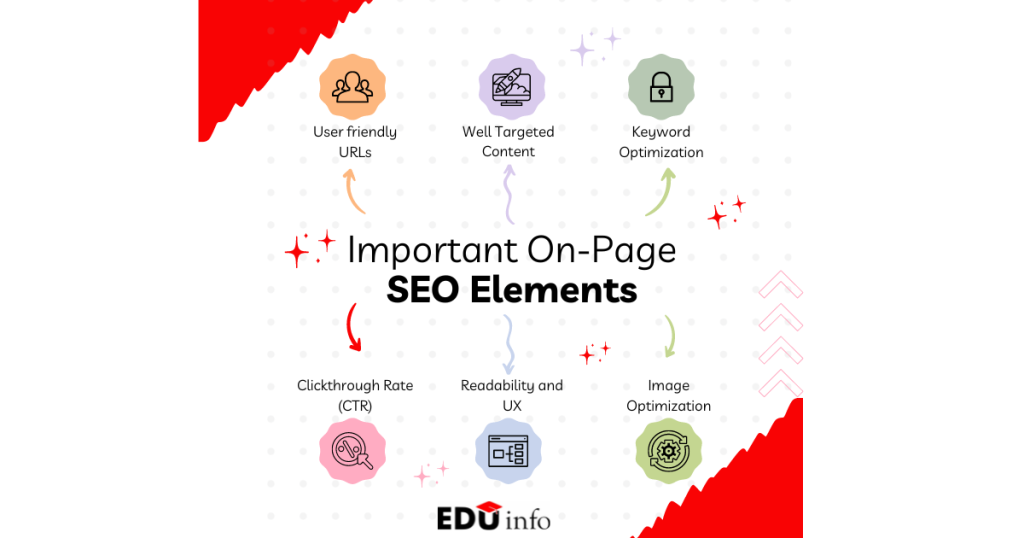
- Meta description and title tag: Write your meta descriptions and tags according to your article, including primary keywords.
- Headings like (H1, H2, H3..): Arrange your content structure according to headings like (H1, H2, H3…..) that guide readers and search engines by your page structure.
- URL structure: Create a friendly, simple, short, and informative URL for your readers.
- Alt text for images: label all your pictures in the content according to the focus keyword and its relevant keywords. Also, rename your photos with the focus keyword on your laptop.
- Mobile-friendliness and Page speed: Optimize your website to load quickly or render well on mobile devices
How to Optimize Keywords for On Page SEO?
Keyword optimization for on page SEO is one of the primary critical points for ranking your website on search engines. So, some vital points are explained below.
Keyword Research in On-Page SEO
Keyword research is a fundamental feature of on-page SEO. It helps identify terms and phrases that users are searching for. By organizing keyword research, you can improve your website content with target keywords that match user search demands and queries to improve its possibility of ranking higher in search results.
Implement Target Keywords in Meta Descriptions and Title Tags
Utilized the targeted keywords in the meta description and title tags that help search engines understand the relevancy of a web page to specific search queries. According to Google, the ideal length of a meta description is 150 to 160 characters. Using relevant keywords in the meta description can enhance the optimization and increase your website’s visibility in the Search engine.
Improving On-Page Optimization Through Relevant Keywords
You have enhanced your website page and content on-page SEO using focus or relevant keywords in headings, body text, or subheadings. Also, add your focus keyword in the first 100 words of your content.
The Role of Tags and Meta Description in On Page SEO
Tags such as meta description, title tags, alt text, and header tags play a substantial role in on page SEO. These features provide priceless information to search engines about a web page’s content.
Title tags in on-page SEO for your content
A title tag is the first thing that users observe in the SERPs. The title of your content gives information and clarity to the user about the content of your website page.
- The title tag must be clear and no more than 55 characters.
- It must contain your focus keyword within 55 characters.
- Your title tag is not only for visitors; search engines also discover your content.
- Avoid keyword stuffing. Don’t use a word over and over in your title tag.
Best example of Title tags for on page SEO
For example, if your main keyword is “Best burger in America “, write it at the beginning of your title tag. Create a catchy hook. Don’t use a word over and over, and keep the character limit around 55 to 60
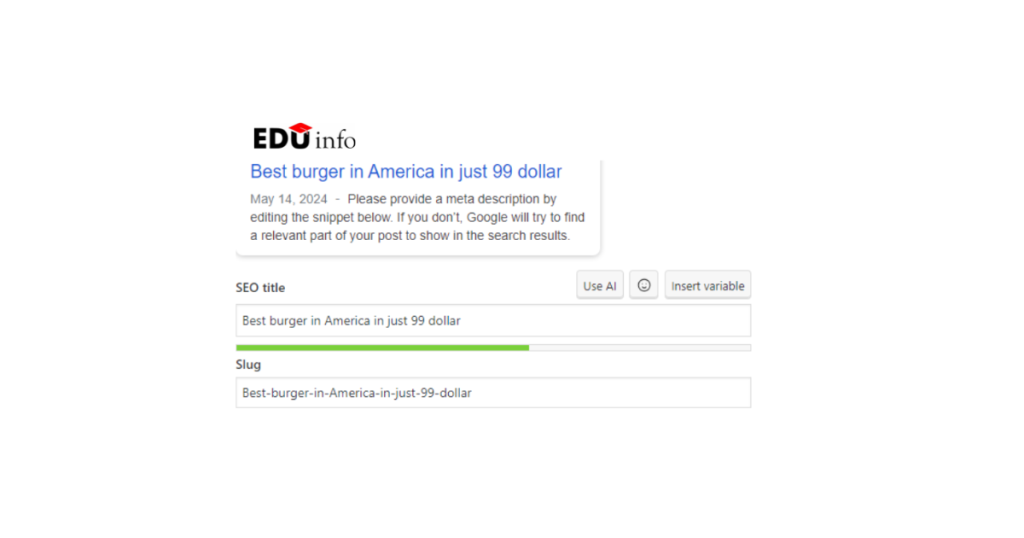
Optimizing Meta Descriptions for Search Engine Visibility
The meta description, like the title tag, is also essential. While the title tag appears at the top of the search result, the meta description is the snippet displayed underneath. The meta description gives an accurate description of your web page’s content.
- Make sure your primary keyword will appear in the meta description.
- The length of the meta description is not longer than 135- 160 characters.
- Like the title tag, do not use the same meta description for every page.
Best example of meta-descriptions for on-page SEO
For example, if your main keyword is “Best burger in America,” use it in the meta description or create a catchy hook. Don’t repeat the same word repeatedly; keep the character limit at 135 to 160.
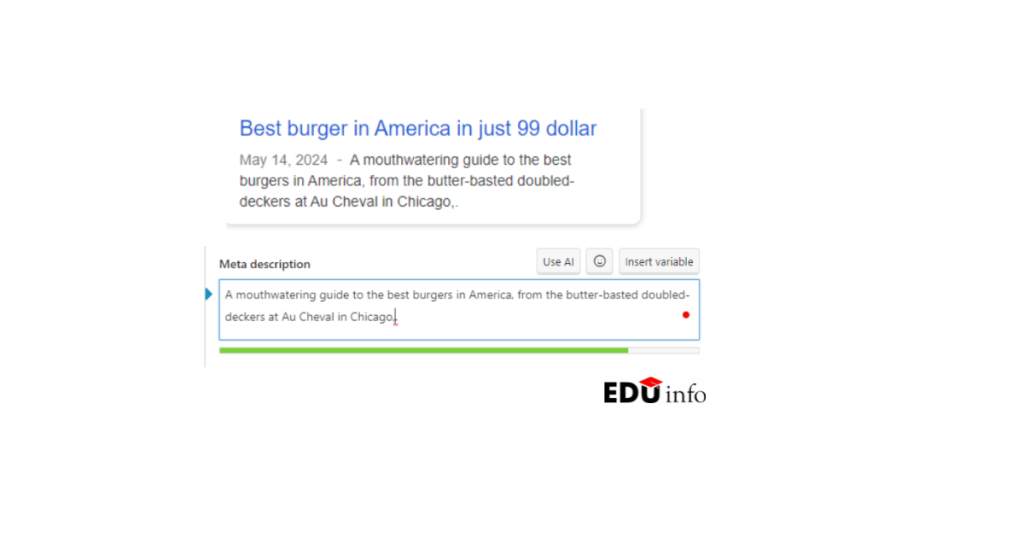
Maximizing URL Structures
- URL must be simple and readable for humans, so your URL must be like
www. edu-info .org/on-page- seo NOT like www. edu .com/index.php
- Use hyphens for breaking up words in the URL
- Write all URLs in lowercase
- Make sure your main keyword is used in the URL.
- Utilize a single domain or subdomain.
Internal Linking Strategies for On Page SEO Success
Establishing a Solid Internal Linking Framework
Links connect different pages within a website and establish an organized layout that helps search engines navigate and catalog content efficiently. They help the website rank in search engines. Through linking pages, website owners can effectively distribute link authority, increase the site’s reach, and enhance the overall user experience.
Obsidian Internal Link No Underline
Obsidian internal link no underline is a tweak to customize the appearance of internal links in the Obsidian note-taking app by removing the default underline style. Users often prefer a clean, minimal look in their Markdown notes, and using custom CSS or community themes, it is possible to display internal links without underlining while still keeping them fully clickable and functional. This tweak increases readability without sacrificing navigation in your vault.
Enhancing User Engagement with Strategic Internal Links
Beyond simplifying website navigation, internal links help direct users to information, keeping them interested and prompting exploration. By incorporating links across the website, site owners can improve user engagement and prolong visitor interaction on their platform.
Optimizing Links for Search Engine Crawling and Indexing
Internal links allow search engine crawlers to locate and index web pages. By establishing a linking system, website administrators can assist search engines in navigating and comprehending site content more effectively, ultimately boosting their presence in search engine results.
Expert Insights on On-Page SEO
SEO Expert: Having on-page SEO is essential for boosting traffic. It plays a role in helping search engines grasp your website’s content and its relevance to user’s search queries.
Marketing Professional: Effective on-page SEO doesn’t just boost rankings. Also enhances user experience and engagement, impacting bounce rates and conversions significantly.
Website Designer: Its technical elements, such as site speed and mobile friendliness, are critical. They do not affect rankings. Are also crucial for keeping users engaged.
Content Producer: Crafting content optimized for the required skill. It entails finding the balance, with keyword usage providing information and creating compelling meta descriptions.”
Real-World Success Stories
The growth of businesses: By optimizing product pages and improving site speed, an e-commerce company experienced a 38% increase in natural website traffic, demonstrating the effectiveness of targeted on-page strategies.
Success with local SEO: A small local business witnessed a 50% rise in online bookings after optimizing for mobile and local search, emphasizing the importance of local visibility.
Achieving results through content strategy: A startup’s commitment to on-page SEO in their blog content led to a 23% boost in traffic, showcasing the positive outcomes of well-optimized content.
Increasing visibility for B2B companies: Through investments in user experience and structured data, a B2B service provider saw a 30% growth in traffic, highlighting the role of on-page SEO in enhancing B2B engagement.
Free tools for improving and checking on-page SEO
A comprehensive audit is essential to enhance your website’s on-page SEO performance. Luckily, there are tools available to help identify areas that need improvement;
Google PageSpeed Insights: Evaluates web page content and provides suggestions to enhance page speed.
SEMRush Site Audit Tool: Offers an analysis of your website’s SEO status. Identifies specific, on-page issues that require attention
MOZ: .Moz Pro may not be completely free. It offers some checks that give you valuable information on optimizing your pages and using keywords effectively.
Yoast SEO: is a WordPress plugin used to check the readability of website content and on page SEO score. It provides suggestions, such as the density of the primary keyword or whether relevant keywords are used in subheadings. Regarding readability, it gives tips about the ratio of transition words and passive voice.
Conclusion
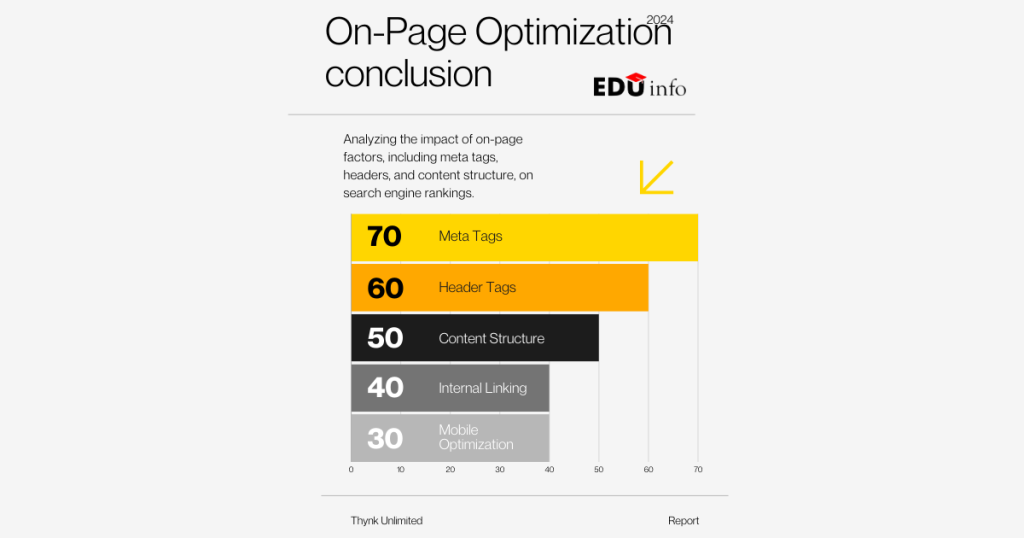
Regarding on-page SEO, it’s essential to keep testing, learning, and refining your strategies. Concentrating on what you can control and utilizing expert advice and tools can enhance your website’s search engine rankings and user experience. Remember that it aims not to improve your ranking but to enhance the overall user experience.
Faq’s
Some faqs are explained below to clear your doubt about it.
What is on page SEO?
Optimizing your webpage for search engines through on-page SEO involves enhancing the content and structure of your page to make it more understandable to Google and relevant to what users are searching for. It’s crucial to adhere to SEO practices to cater to both visitors and search engine algorithms. Critical components of on-page SEO encompass refining HTML elements, optimizing images, and creating SEO content. Conducting an audit of your on page SEO can be facilitated by utilizing tools such as the Semrush site audit tool or a pre-designed template. By leveraging these resources and following a guide, you can ensure your webpage is effectively optimized for search engine visibility.
What is an example of an on-site SEO?
On-page SEO is optimizing every page on your website to improve your SEO ranking. It includes elements like the title and structure of a page. These factors can make or break your SEO success.
What is on-page SEO vs local SEO?
On-page SEO is focused on optimizing a particular web page to rank higher for more organic traffic. It includes meta tags optimized content or internal linking.
Local SEO is also called on-site SEO. In this, we focus on website optimization for a specific location. The main difference is that we optimized the content according to the location-based keyword.
What is the difference between on-site SEO and off-site SEO?
On-page SEO optimizes the website content according to meta tags, meta descriptions, and content that helps you rank on search engines. On the other hand, off-page SEO involves building backlinks—and social media engagements to increase the website’s authority.
